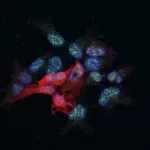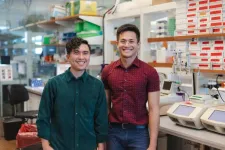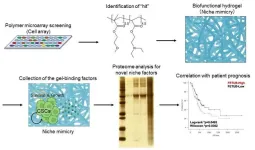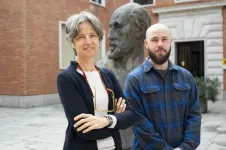Bringing top data scientists from a variety of fields together with clinicians and cancer scientists, the institute builds on MD Anderson’s culture of collaboration and connectivity to tackle the field’s most pressing needs in new and innovative ways. IDSO’s efforts have been catalyzed by philanthropic and institutional support of more than $61 million, representing significant progress toward an initial fundraising goal of $100 million.
“The answers to overcoming cancer are within our reach, and we owe it to our patients and their families to move beyond traditional approaches to find those answers quickly,” said David Jaffray, Ph.D., director of IDSO and chief technology and digital officer at MD Anderson. “The institute is changing the way we work, incorporating the next generation of computational approaches and team data science across MD Anderson. By making data part of every decision, we will ensure progress for our patients and their families at the pace needed to address the urgent problem of cancer.”
MD Anderson generates an immense amount of data annually, including complex clinical information and expansive laboratory datasets. Building on the most advanced data and computational scientific methods available, IDSO is revolutionizing how the institution leverages data to fuel new discoveries, optimize the patient experience and personalize cancer care.
“At MD Anderson, we are intimately familiar with the urgent needs and challenges facing our patients, and we will find the best solutions possible by unlocking the full power of the growing and increasingly complex data,” said Caroline Chung, M.D., director of Data Science Development and Implementation for IDSO and chief data officer at MD Anderson. “The institutional commitment to this effort enables us to build an unmatched oncology data ecosystem that fuels effective collaborations across MD Anderson and around the world.”
Through its work, IDSO not only allows for better analysis of existing data but also changes how MD Anderson generates, collects and manages data. This comprehensive approach enables research and clinical teams to derive new and deeper insights that can be applied to accelerate drug discovery and development, to improve scheduling and access for patients, to enhance the safety and quality of care, and to allow for personalized treatment decisions based on results and predictions from diagnostic tests.
“The Institute for Data Science in Oncology positions MD Anderson as a leader in data science for cancer care, discovery and clinical operations. Its innovative programs will be, in many cases, the first generation of data science applied to the challenge of ending cancer,” said Peter WT Pisters, M.D., president of MD Anderson. “The institute is a critical element of our institutional strategy, and it will transform how MD Anderson uses data to advance discoveries and make the greatest impact on humanity.”
Teaming up on focused areas of opportunity
The institute unites MD Anderson’s clinical and research communities in transformative data efforts, offering new opportunities for collaborations across the institution and with external researchers and industry colleagues. Located in the Texas Medical Center’s Helix Park and housed in the TMC3 Collaborative Building, IDSO brings together experts in medicine, science, academia and industry.
Led by Jaffray and Chung, IDSO is engaging top data science experts to direct established focus areas. Current co-leads who already have joined IDSO include Bissan Al-Lazikani, Ph.D., professor of Genomic Medicine; Heiko Enderling, Ph.D., professor of Radiation Oncology; Jeffrey Siewerdsen, Ph.D., professor of Imaging Physics; and Yinyin Yuan, Ph.D., professor of Translational Molecular Pathology.
IDSO is focused on five initial priority areas, selected based on alignment with clinical practice and the existing technology required for meaningful progress. These include:
Quantitative Analysis and Insights from Pathology and Medical Imaging
Led by Chung and Yuan, this focus area is advancing automated tools and AI algorithms to tap into the information within medical imaging data, including radiology and pathology, creating tools to more rapidly diagnose and characterize cancer and to provide effective, predictive measures of treatment response to guide personalized treatments. Multi-Cell Interactions Informed Through Single Cell Analytics and Data Science
Aligning with MD Anderson’s strong basic science and bioinformatics community, IDSO is driving a deeper fundamental understanding of cancer biology to uncover new therapeutic opportunities. IDSO is collaborating with the James P. Allison Institute to strengthen data science capabilities in order to extract insights from the explosion of single cell and spatial transcriptomics data. Computational Modeling for Discovery, Development and Optimization of Precision Medicine
Led by Al-Lazikani and Enderling, this focus area is applying advanced computer modeling, novel AI techniques and digital twin approaches to discover, design and advance novel therapeutics and regimens. These efforts integrate with canSAR, the world’s largest public cancer drug discovery resource, now hosted at MD Anderson to benefit the research community worldwide. Equitable Decision Analytics for the Health of the Person and Society
IDSO is advancing data-driven, computationally informed approaches to support personal and societal decision making. By developing a more complete understanding of the multi-dimensional impact of cancer — personal, economic, and societal — we can explore innovations across the continuum of health to identify those with the greatest potential for impact. Development of Automated Approaches to Increase Access, Safety and Quality
Under the leadership of Siewerdsen, this focus area is building data-science expertise to optimize the patient experience for those seeking care at MD Anderson. Efforts include improving patient access, optimizing the quality of care, and maximizing the safety of our treatment environments. The institute continues to recruit top scientists from around the world and is training the next generation of pioneers in the field, creating a diverse and inclusive environment that facilitates seamless engagement with MD Anderson’s clinicians and researchers. The IDSO Fellows program, led by Christopher Gibbons, Ph.D., associate professor of Symptom Research, is designed to offer postdoctoral training opportunities for junior clinicians and researchers that will empower them to become leaders in data science for oncology.
Together with Dan Shoenthal, chief innovation officer at MD Anderson, IDSO is engaging with leaders in the field to establish relationships that can advance priority initiatives, including ongoing initiatives with industry collaborators as well as The University of Texas at Austin Oden Institute for Computational Engineering and Sciences and the Texas Advanced Computing Center, Rice University and Break Through Cancer.
Philanthropic support accelerates the impact of data science
Generous support from dedicated donors across the nation is accelerating the far-reaching, long-term possibilities of IDSO. Philanthropic investments enable the institute to hire and train exceptional talent and to rapidly build the necessary infrastructure to carry out its work, resulting in meaningful improvements for patients and their families.
IDSO has received significant commitments from the Commonwealth Foundation for Cancer Research, Lyda Hill Philanthropies, the Hackett Family, the Laura and John Arnold Endowment and more, including an anonymous donor. Matching funds are expected from multiple organizations, including the Commonwealth Foundation.
“The inspired actions of our donors speak volumes about the potential of this institute to make meaningful impacts on the next era of cancer research and care,” Jaffray said. “We are grateful for their boundless generosity and their dedication to our mission to end cancer.”
Read this press release in the MD Anderson Newsroom.
- 30 -
END





